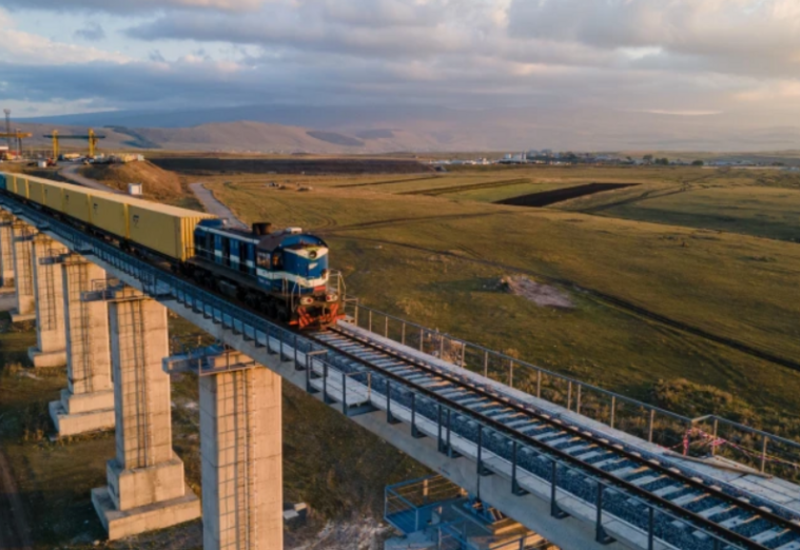|
|
TODAY.AZ / Business
Azerbaijan reviews effective ways to combat inflation: economists upbeat on export policy
02 April 2024 [08:30] - TODAY.AZ

The Central Bank of Azerbaijan (CBA) has maintained its 2024 inflation forecast at the same level as in January, at 5.3%. The overall risks associated with inflation, whether increasing or decreasing, are seen to offset each other.
"Given the current conditions, it is anticipated that annual inflation for the year will likely stay within the target range of 4% plus or minus 2%. Analysis indicates that there may be a downward revision in the forecast for the remainder of the year," as per the CBA's announcement.
"Since the previous meeting, there has been a continued decrease in the annual inflation rate. In February of this year, the 12-month inflation rate stood at 0.8%, with a 12-month base inflation rate of 1.4%. Annual food deflation was recorded at 0.3%, while non-food inflation and service inflation stood at 1.4% and 2.3% respectively," the bank added.
Here posses several questions, first up, concerning the reasons for balancing the increasing and decreasing risks of inflation, then whether annual inflation is expected to remain within the target range this year, and most importantly, the term of inflation that is to be maintained at a stable level.
The economist Elshad Mammadov stated to Azernews that approaches existing regarding the increasing and decreasing risks of inflation do not fully reflect themselves in real practical economics.

"This also implies that there are serious problems with diagnosing and identifying inflation. We often witness various explanations. These explanations often note that there are many inflation risks, hence the need to reduce the money supply. It is necessary to tighten credit policy. The regulation of the money supply, the application of methods to combat inflation, I believe, does not yield its effect. Because the inflation existing in the country is not related to the money supply, it is not demand inflation. It is primarily related to the supply sphere, which has a completely different nature. Therefore, these expectations often do not materialize," he said.
The expert clarified the most efficient way to prevent this. He talked about an effective method of fighting against inflation.
"To effectively combat inflation, we must produce more, instead of increasing the money supply and directing it towards investment. Otherwise, there will be a high dependence on imports, which itself means inflation risks. At the same time, we will witness high prices of local products, which we can already observe. Because when credit policy tightens, bank interest rates rise, ultimately leading to higher prices for local products, which is also inflation. Therefore, within the framework of effective combat, we must restrain inflation against local production," Mammadov emphasised.
The economist believes that maintaining inflation within the target range is more dependent on methodology.
"There are issues within the framework of the rules for calculating inflation, and this is not solely a matter specific to Azerbaijan. That is to say, real inflation often differs from the officially declared statistics. Therefore, it is possible that inflation will be recorded at the end of the year within the framework of the officially declared figures. But in reality, the population will feel other indicators in their pockets," he pointed.
In addition, the expert emphasized that the tight monetary credit policy in the fight against inflation, despite helping to keep prices stable in the short term, contradicts some requirements and is extremely ineffective.
"The sustained stability of inflation cannot be achieved through a tight monetary credit policy in the long term. Because within the framework of a tight monetary credit policy, we can maintain prices in the short term by constraining demand, but ultimately, this will not be effective. Because a tight monetary credit policy affects production, which, as I mentioned earlier, will lead to an increase in imports and a rise in the price of local production. At the same time, a tight monetary credit policy also encourages monopolies. Monopolies, undoubtedly, act as a factor stimulating price increases," the economist added.
URL: http://www.today.az/news/business/246614.html
 Print version
Print version
Connect with us. Get latest news and updates.
See Also
- 05 February 2026 [14:31]
Hazelnut export value climbs with strong growth - 05 February 2026 [11:56]
SOCAR AQS enters tenders for drilling projects in Iraq - 05 February 2026 [10:22]
ADB approves $2 mln for private capital mobilization projec in Azerbaijan and Asia - 04 February 2026 [10:42]
SOCAR plans to drill 80 wells and conduct over 500 operations this year - 03 February 2026 [18:13]
Sales, technical and finance roles top Azerbaijan’s staff shortage list - 03 February 2026 [14:40]
Digital payments in Azerbaijan set for major expansion, Mastercard report finds - 03 February 2026 [12:59]
Türkiye, Kazakhstan agree to deepen cooperation on Middle Corridor development - 02 February 2026 [15:31]
SOCAR considers expanding use of drones and advanced monitoring technologies - 02 February 2026 [13:42]
$2.6 million invested in 22 startups in 2025, says IRIA Chair - 02 February 2026 [13:35]
SOCAR, Huawei discuss digital transformation and advanced technologies in oil, gas sector
Most Popular
 Zangezur corridor become part of TEN-T: European Union is joining fight for South Caucasus
Zangezur corridor become part of TEN-T: European Union is joining fight for South Caucasus
 Norwegian parliament to debate abolishing monarchy over 'Epstein' crisis
Norwegian parliament to debate abolishing monarchy over 'Epstein' crisis
 bp commemorates Magsud Ibrahimbayov’s birth anniversary
bp commemorates Magsud Ibrahimbayov’s birth anniversary
 Rumors about the Catholicos’ arrest are circulating in Armenia once again, raising the question of their purpose
Rumors about the Catholicos’ arrest are circulating in Armenia once again, raising the question of their purpose
 Azerbaijan, Armenia and Masdar
Azerbaijan, Armenia and Masdar
 Iran charges state TV staff after mockery of protest victims sparks outrage
Iran charges state TV staff after mockery of protest victims sparks outrage
 Israeli tourism to Azerbaijan soars, prompting flight expansion
Israeli tourism to Azerbaijan soars, prompting flight expansion
